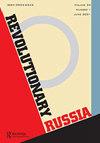Introduction
IF 0.2
2区 历史学
Q2 HISTORY
引用次数: 0
Abstract
This special issue of the journal is to mark the retirement of Jonathan ‘Jon’ D. Smele in June 2020 from Queen Mary, University of London. Jon has made fundamental contributions to our general understanding of the Russian Civil War and to our comprehension of the Kolchak regime in Siberia. He has also produced deeply researched reference volumes. These intellectual achievements are discussed in Evan Mawdsley’s article in this issue. Jon is also familiar to the field and to readers of this journal as its editor from 2002–11. Editing a major journal is a large responsibility. Jon stepped naturally into the role, combining patience, attention to detail, and sound scholarly advice. Trusted and valued for his knowledge, Jon’s curiosity and passion for new research made him a wonderful correspondent. Here was an editor who actually read and empathized with the author’s endeavours and could reach his own independent evaluation. There was nothing mechanistic about Jon as editor. Reading a decade of his editorship, the only constant is the commitment to originality. If this meant publishing a single author on a single theme several times over several issues, then so be it. Jon was also receptive to publishing articles by amateur historians and encouraged younger scholars to begin their publication career with Revolutionary Russia. Jon’s respect for the Study Group and for its journal, initially Sbornik and subsequently Revolutionary Russia, is evident from his own articles in the journal, of which there are many, including an account of the first thirty years of the Study Group in a 2005 issue. His penchant for editorial roles also includes being founding co-editor, along with Michael Melancon, of the Bloomsbury History of Modern Russia series. Jon undertook a BA in International History and Politics at the University of Leeds (1977–80). His interest in Russian and Soviet history, and in particular the Russian Civil War, took off when he joined the MPhil in Soviet and East European Studies at the University of Glasgow (1981–83). This course offered instruction in Russian, as well as a host of options covering the history, economics, politics, and international relations of the USSR. It was taught within the Institute of Soviet and East European Studies, famous as the home of the journal Soviet Studies, and for ideological analyses and debates of the Soviet system, most notably between Alec Nove and Hillel Ticktin. It was an exciting intellectual and publishing environment in which Jon focused on historical studies under James ‘Jimmy’ D. White and Evan Mawdsley, writing his MPhil thesis on Kolchak, a topic suggested by Jimmy. Alas, Glasgow did not have the funds to keep Jon on for his PhD. This opportunity arrived through a scholarship that Roger Pethybridge had arranged and advertised. Jon applied, was successful, and began his doctoral research in 1984. The PhD was awarded at the University of Wales (Swansea) in 1991. Whilst still working on his PhD, Jon started work as a Temporary Lecturer in Russian History at the University of Edinburgh (1988–91). This was followed by a介绍
该杂志的这期特刊是为了纪念乔纳森·斯梅尔于2020年6月从伦敦大学玛丽女王学院退休。乔恩为我们对俄罗斯内战的总体理解和对西伯利亚科尔恰克政权的理解做出了根本性贡献。他还出版了经过深入研究的参考书。Evan Mawdsley在本期的文章中讨论了这些智力成就。Jon在2002年至2011年担任该杂志的编辑,对该领域和该杂志的读者也很熟悉。编辑一份重要期刊是一项重大责任。乔恩自然地扮演了这个角色,结合了耐心、对细节的关注和合理的学术建议。Jon对新研究的好奇心和热情使他成为一名出色的记者。这是一位编辑,他真正阅读并同情作者的努力,并能够得出自己的独立评价。乔恩担任编辑一点也不机械。读了他十年的编辑生涯,唯一不变的就是对独创性的承诺。如果这意味着在几个问题上多次就同一主题发表一位作者,那就这样吧。Jon也乐于接受业余历史学家发表的文章,并鼓励年轻学者从革命俄罗斯开始他们的出版生涯。Jon对研究小组及其期刊《Sbornik》和《革命俄罗斯》的尊重从他自己在该期刊上的文章中可见一斑,其中有很多文章,包括2005年一期关于研究小组成立前三十年的描述。他对编辑角色的偏好还包括与迈克尔·梅兰肯一起担任《布卢姆斯伯里现代俄罗斯史》系列的创始联合编辑。Jon于1977–80年在利兹大学获得国际历史与政治学士学位。他对俄罗斯和苏联历史,特别是俄罗斯内战的兴趣在1981年至83年加入格拉斯哥大学苏联和东欧研究MPhil后开始高涨。该课程提供俄语教学,以及涵盖苏联历史、经济、政治和国际关系的一系列选项。它是在苏联和东欧研究所教授的,该研究所以《苏联研究》杂志的故乡而闻名,并用于苏联制度的意识形态分析和辩论,最著名的是在亚历克·诺维和希勒尔·蒂克廷之间。这是一个令人兴奋的知识和出版环境,在这个环境中,Jon在James‘Jimmy’D.White和Evan Mawdsley的指导下专注于历史研究,并撰写了关于Kolchak的MPhil论文,这是Jimmy提出的一个主题。遗憾的是,格拉斯哥没有足够的资金让乔恩继续攻读博士学位。这个机会是通过罗杰·佩特赫里奇安排并宣传的奖学金而来的。Jon申请了,很成功,并于1984年开始了他的博士研究。博士学位于1991年授予威尔士大学(斯旺西)。在攻读博士学位期间,Jon开始在爱丁堡大学担任俄罗斯历史临时讲师(1988-1991)。然后是
本文章由计算机程序翻译,如有差异,请以英文原文为准。
求助全文
约1分钟内获得全文
求助全文

 求助内容:
求助内容: 应助结果提醒方式:
应助结果提醒方式:


